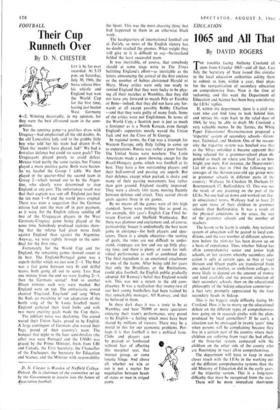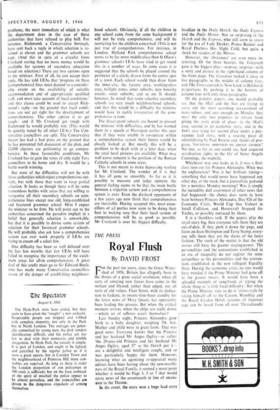1065 and All That
EDUCATION
By DAVID ROGERS
HE troubles facing Anthony Crosland all I stem from Circular 1065—and all that. Last July the Secretary of State issued this circular
to the local education authorities asking them to submit to him, within a year, their plans for the reorganisation of secondary education on comprehensive lines. Now is the time of reckoning, and this week the Department of Education and Science has been busy considering the LEAs' replies.
If, within the department, there is a civil ser- vant who can find time to look behind him, and retrace his steps back to the salad days of 1944, he may be able to draft Mr Crosland a very valuable memo. In the 'forties, the White Paper Educational Reconstruction proposed a `tripartite' system of secondary schools—Gram- mar, Technical. and Modern. One of the reasons why the tripartite system was botched was that as the 'fifties unfolded it became apparent that being selected for a grammar-school place de- pended as much on where you lived as on how bright you were. For instance, the Department's List 69 shows that in 1964 the following per- centages of the thirteen-year-old age group were in grammar schools in different parts of the country: Wallasey 34, Cheshire 30, Durham 18. Bournemouth 17, Bedfordshire 13. This was not the result of any planning on the part of the LEAs. No one had sat down and worked out that. in educational terms, Wallasey had to have 21 per cent more of their children in grammar schools than Bedfordshire. It was a result of the physical conditions in the areas, the size of the grammar schools and the number of teachers.
The lesson to be learnt is simple. Any national system of education will be geared to local con- ditions, and the vast number of different schemes now before the minister has been drawn up on a basis of expediency. Thus, whether Sidcup has all-in comprehensive senior and junior high schools, or tier systems whereby secondary edu- cation is split at certain ages, so that at (say) thirteen and fifteen pupils are transferred from one school to another, or sixth-form colleges, is more likely to depend on the amount of money and land available and the present situation of their secondary schools, than on the educational philosophy of the Sidcup education committee— a fact very promptly appreciated by the four secondary heads in Sidcup.
This is the biggest single difficulty facing Mr Crosland. How is he to marry up the educational debate on the different types of comprehensives now going on in research circles with the plans produced by local councillors? If he can't, a situation can be envisaged in twenty years' time when parents will be complaining because they live in a certain part of the country where their children are suffering from (say) the bad effects of the three-tier system, compared with the children on the other side of the county who are flourishing in (say) all-in comprehensives.
The department will have to keep in much closer touch with the LEAs in the working out of the different comprehensive systems than the old Ministry of Education did in the early years of the tripartite. system. This is a long-term difficulty that must be recognised from the start.
There will be more immediate short-term
problems, the most immediate of which is what the department does in the case of those authorities that have refused to play ball. For instance, Richmond, a Conservative borough, have sent back a reply in which selection is re- tained at eleven and the grammar schools are kept. (And this in spite of a circular from Crosland stating that no more money would be available for systems of secondary education based on selection.) There are two options open to the minister. First of all, he can accept their reply. He has told LEAs that 'progress on these [comprehensive] lines must depend to a consider- able extent on the availability of suitable accommodation and of appropriately qualified staff, and must take account of local conditions,' and that clause could be used to accept Rich- mond's reply—on the ground that local condi- tions are not yet right for the development of comprehensives. The other option is to get tough: and if Mr Crosland got tough with Richmond he would probably win. (This would be quickly noted by all other LEAs.) The Con- servative councillors are split. The Conservative mayor has had a bad press on the ground that he has prevented full discussion of the plan, and 12,000 electors are petitioning to go compre- hensive. In these favourable conditions, Mr Crosland has to gain the votes of only eight Tory councillors to be home and dry. It would be a battle worth winning.
But most of the difficulties will not be with those authorities which reject comprehensives out- right, but with those that want to keep partial selection. It looks as though there will be some tremendous battles with areas that are willing to reorganise all their secondary schools on com- prehensive lines except one old, long-established and favoured grammar school. Here I expect the minister to be firm. He will point out to the authorities concerned the paradox implicit in a belief that generally selection is unworkable, but that it is possible to devise some system of selection for their favoured grammar schools. He will probably also ask how a comprehensive system can ever work properly if LEAs are trying to cream off a select few.
One difficulty has been so well debated over the last few months that few LEAs will have failed to recognise the importance of the catch- ment areas for all-in comprehensives. A great deal of this credit must go to Sir Edward Boyle, who has made many Conservative councillors aware of the danger of establishing neighbour-
hood schools. Obviously, if all the children in one school came from the same background it will not be truly comprehensive, and will be restricting for the children concerned. (This is not just true of comprehensives. For instance, in London, Holland Park comprehensive school seems to be far more middle-class than St Olave's grammar school.) LEAs have tried to get round this in a number of ways. In some cases it is suggested that the schools be placed around the perimeter of a circle, drawn from the centre spot of a town. Each school would then draw from the inner-city, the factory area, working-class area, twilight zones, inner suburbs, new housing estates, outer suburbs, and so on. It should, however, be noted that some selective secondary schools are very much neighbourhood schools, and that this would be a difficulty the ministry would have to tackle irrespective of the com- prehensive system.
The direct-grant schools are bound to present the minister with difficulties, and he has warned them in a speech at Harrogate earlier this year that if they were unable to co-operate within a comprehensive system their future would be closely looked at. But mostly this will be a problem to be dealt with at a later date, when the total local pictures are available. What may well cause concern is the position of the Roman Catholic schools in some areas.
This is not meant to make depressing reading for Mr Crosland. The wonder of., it is that it has all gone so smoothly. As far as it is possible to measure and judge opinion, the general feeling seems to be that the main battle between a tripartite system and a comprehensive system is over. Even the die-hard opponents of a few years ago now think that comprehensives are inevitable. Having accepted this, most coun- cillors of all parties now seem to be doing their best to making sure that their local system of comprehensives will be as good as possible. Mr Crosland is over his biggest difficulty.






























 Previous page
Previous page